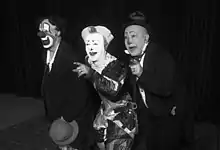英语

The clown brothers Albert, François and Paul Fratellini of the famous Italian Fratellini family in 1932
出身意大利著名家族Fratellini家族的小丑兄弟Albert、François以及Paul,摄于1932年
出身意大利著名家族Fratellini家族的小丑兄弟Albert、François以及Paul,摄于1932年
词源
发音
- 國際音標(幫助):/ˈzeɪni/
(英国)音频: (檔案)
- 韻部:-eɪni
- 斷字:za‧ny
形容词
(比較級,最高級)
- 滑稽的
- 2013, William Paul, “No Escaping the Depression: Utopian Comedy and the Aesthetics of Escapism in 's (1938)”, 出自 A Companion to Film Comedy, Chichester, West Sussex: , →ISBN,頁號 280:
- This runs counter to the play, where Grandpa is always benignly indulgent of all his zany progeny and their equally zany spouses, and is even somewhat zany himself.
- (請為本引文添加中文翻譯)
- 2015, Kimberly D. Nettles-Barcelón, “The Sassy Black Cook and the Return of the Magic Negress: Popular Representations of Black Women's Food Work”, 出自 Jennifer Jensen Wallach 編, Dethroning the Deceitful Pork Chop: Rethinking African American Foodways from Slavery to Obama, Fayetteville, Ark.: , →ISBN,頁號 117:
- The montage goes on to show scenes of Carla singing, dancing, meditating, breaking the tension amongst her co-cheftestants with sing-a-longs and “hootie-hoo” lessons, and ultimately wooing the judges with a combination of her zany personality and solid cooking skills.
- (請為本引文添加中文翻譯)
- 荒唐的,可笑的
近义词
衍生词汇
名词
(複數)
- (棄用) 小丑 (尤指滑稽模仿主要丑角的)
- a. 1631, John Donne, Epistle to Mr. I. W.
- Then write that I may follow, and so be / Thy echo, thy debtor, thy foil, thy zany.
- 1728, Alexander Pope, “Book III”, 出自 :
- O great restorer of the good old stage, / Preacher at once, and Zany of thy age!
- (請為本引文添加中文翻譯)
- Template:RQ:Falkner Moonfleet
- 1996, Fiona Haslam, From Hogarth to Rowlandson: Medicine in Art in Eighteenth-century Britain, Liverpool: , →ISBN,頁號 69:
- Part of the illusory world is the 'quack' or mountebank who can be seen standing on his own special platform in the centre of the crowd […]。Such a person travelled round to fairs and markets selling his nostrums or medicines. This character is dressed in a lace hat, long periwig and embroidered coat with lace cuffs, and is attended by his zany, who is wearing a chequered harlequin outfit and is 'quacking' or 'puffing' his master's wares. No seventeenth- or eighteenth-century mountebank was complete without his zany or 'Merry Andrew' – a term originally applied to Dr Andrew Boorde, physician to Henry VIII and noted for his ready wit and humour, who was the subject of many broadside ballads.
- (請為本引文添加中文翻譯)
- a. 1631, John Donne, Epistle to Mr. I. W.
动词
(第三人稱單數簡單現在時,現在分詞,一般過去時及過去分詞)
参考资料
- John Dover Wilson, comp. (1911) Life in Shakespeare's England: A Book of Elizabethan Prose, Cambridge: At the University Press, OCLC 2938084。
异序词
- ,
This article is issued from Wiktionary. The text is licensed under Creative Commons - Attribution - Sharealike. Additional terms may apply for the media files.